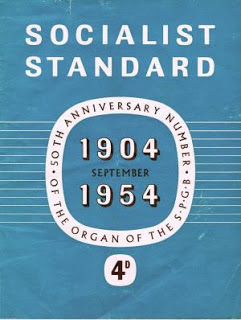The first number of the Socialist Standard came out in September, 1904, a few years after the Boer War had ended and before World Wars had come into the picture. At that time the German Social Democratic Party had the support of millions, the Socialist Party of America was strong enough to put forward a candidate for the Presidency, in France, Austria and Italy, there were strong parties claiming to be Socialist, and even in the East the movement had spread—Russia, China and Japan, had small parties. Labour Parties and Welfare States had not yet emerged from the reformist womb, and the emptiness of nationalisation as a panacea for social ills had yet to be demonstrated.
To the uncritical it looked as if Socialism was “just round the comer.” What they overlooked was the weakness of the parties that claimed to be Marxian and the futility of those that did not. All of them were tied to reform programmes that ultimately put out the fire of revolution they had lighted; all of them were dominated by the fatal principle of leadership and all of them collapsed under the blow of the first Great War.
On the first page of the first number of the Socialist Standard there was an article from which we take the following paragraphs
“ In the Socialist Party of Great Britain we are all members of the working class, and cannot hope that pur articles will always be finely phrased, but we shall at least endeavour to lay before you on every occasion a sane and sound pronouncement on all matters affecting the welfare of the working class. What we lack in refinement of style we shall make good by the depth of our sincerity and by the truth of our principles.”. . .“In dealing with all questions affecting the welfare of the working-class our standpoint will be frankly revolutionary. We shall show that the misery, the poverty, and the degradation caused by capitalism, grows far more rapidly than does the enacting of palliative legislation for its removal. The adequate alleviation of these ills can be brought about only by a political party having Socialism for its object. So long as the powers of administration are controlled by the capitalist class so long can that class render nugatory any legislation they consider to unduly favour the workers.”
That has been the outlook of the Socialist Standard during the past fifty years.
The leading article of the first number set down in detail the position of the workers under Capitalism and the only solution to their problems. On another page our Declaration of Principles was printed, and it is exactly the same as has appeared in every issue since.
Everything of fundamental importance that had a bearing on Socialist policy has been thoroughly examined and discussed in the Socialist Standard over the years.
The position and function of Trade Unions and the Socialist attitude towards them was the subject of discussion that appeared during some months of 1906. Industrial Unionism was the subject of numerous articles and correspondence from 1904 almost to the present day.
When the first Great War broke out in 1914 we printed our War Manifesto, in September of that year, in which we proclaimed our opposition to war, set forth the causes of war in the modern world, and pointed out that victory or defeat left the position of the workers, as a subject class, untouched.
When the Russian Revolution occurred in 1917 we printed an article which examined what lay behind that upheaval and stated, what subsequent history made plain, that it was not, and could-not be, a Socialist Revolution. As information came along later we demonstrated from the facts available the accuracy of our original statement.
In 1926 we showed the weakness of the General Strike and urged that, if the workers came out on strike they should do so in a body; if not successful within a short time they should go back in a body and not drift back. We pointed out that if they drifted back they would undo the work of years. In fact they were let down by the leaders they trusted and the masters were enabled to get rid of many limitations on their profit hunting that the workers had previously achieved.
In 1939, when the second Great War broke out, we reiterated the position we had put forward in 1914. In both wars our propaganda efforts suffered heavily. In the first war our speakers were arrested and our Head Office raided. In the second war we fared a little better but our Head Office suffered from bombing and it and much of our literature and records were destroyed.
In recent years we have put forward candidates for
Parliament and our election literature has been reprinted in the Socialist Standard.
In the course of fifty years the Socialist Standard contains a faithful record of our work and our progress. In its columns will be found a mass of searching theoretical and historical articles that cover the main facts, principles, and policies, that are useful to the workers in their struggle to emancipate themselves from their subject position and to achieve the aim that we have unflaggingly put before them, the establishment of Socialism—a new form of society in which each will give according to his capacities and take according to bis needs.
When the workers understand, accept and act upon the views we have been pressing to their notice the social ills they suffer from today will vanish like a bad dream.

.jpg)






